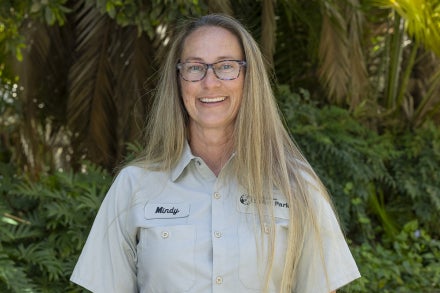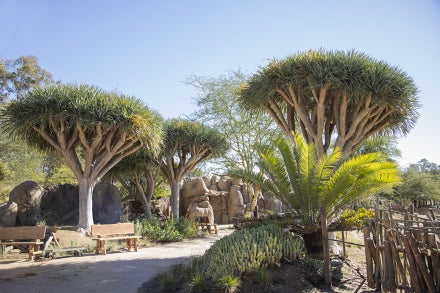
By now, you have probably heard about the report released by the Great Elephant Census. And if not, here’s a very simple summary of a very comprehensive three-year study: the African elephant population decreased by nearly one-third between 2007 and 2014. So, what does that mean? It means the population decreased rapidly by 144,000 individuals, mostly due to aggressive poaching.
[caption id="attachment_119073" align="alignnone" width="1600"] Photo by Rick Schwartz[/caption]
To give you an idea of what that number looks like, 144,000 people would fill San Diego’s Qualcomm Stadium, twice. Or, think of it this way: that number is nearly one and a half times the population of the city of Green Bay, Wisconsin. No matter how you look at it, 144,000 is a lot of people—and a lot of elephants. When it comes to African elephants, that number signifies a devastating loss.
My first trip to Africa was seven years ago, to see elephant conservation in action in Botswana. Known as one of the safest places for wildlife, large-scale poaching had not been a big problem there, and Botswana was free from political unrest and war. Because of that, Botswana was indeed home to the largest population of elephants. My week there was spent with Mike Chase, Ph.D., the principal researcher and coordinator of the Great Elephant Census. He’ll be the first to tell you he is only one person on a bigger team—but having spent time with him, I can tell you that his team wouldn’t be there if it wasn’t for Mike’s infectious passion to save the magnificent elephant from extinction.
[caption id="attachment_119074" align="alignnone" width="1600"]
Photo by Rick Schwartz[/caption]
To give you an idea of what that number looks like, 144,000 people would fill San Diego’s Qualcomm Stadium, twice. Or, think of it this way: that number is nearly one and a half times the population of the city of Green Bay, Wisconsin. No matter how you look at it, 144,000 is a lot of people—and a lot of elephants. When it comes to African elephants, that number signifies a devastating loss.
My first trip to Africa was seven years ago, to see elephant conservation in action in Botswana. Known as one of the safest places for wildlife, large-scale poaching had not been a big problem there, and Botswana was free from political unrest and war. Because of that, Botswana was indeed home to the largest population of elephants. My week there was spent with Mike Chase, Ph.D., the principal researcher and coordinator of the Great Elephant Census. He’ll be the first to tell you he is only one person on a bigger team—but having spent time with him, I can tell you that his team wouldn’t be there if it wasn’t for Mike’s infectious passion to save the magnificent elephant from extinction.
[caption id="attachment_119074" align="alignnone" width="1600"] Photo by Rick Schwartz[/caption]
When we first headed into Chobe National Park, traveling along the northern side that is defined by the Chobe River, I was treated to seeing more wildlife in the first 10 kilometers of our trek than I had ever seen before. And yes, there were elephants. Elephant families with members of all ages quietly foraging for food, paying no mind to our research vehicle passing by. We saw elephants every day. In all fairness, we were with the one guy in the area who knows where all the elephants are. Having grown up in Botswana, Mike knew this area and the wildlife better than most. His life has been spent studying elephants, and the conflicts between humans and elephants that have occurred as the human population grows.
Now, seven years later, Mike has reported that poaching is occurring in Botswana, and more than 20 elephants were poached in Chobe National Park. It is almost overwhelming to realize that there are no more “safe” places in the wild, and even managed parks are now being targeted.
[caption id="attachment_119075" align="alignnone" width="1600"]
Photo by Rick Schwartz[/caption]
When we first headed into Chobe National Park, traveling along the northern side that is defined by the Chobe River, I was treated to seeing more wildlife in the first 10 kilometers of our trek than I had ever seen before. And yes, there were elephants. Elephant families with members of all ages quietly foraging for food, paying no mind to our research vehicle passing by. We saw elephants every day. In all fairness, we were with the one guy in the area who knows where all the elephants are. Having grown up in Botswana, Mike knew this area and the wildlife better than most. His life has been spent studying elephants, and the conflicts between humans and elephants that have occurred as the human population grows.
Now, seven years later, Mike has reported that poaching is occurring in Botswana, and more than 20 elephants were poached in Chobe National Park. It is almost overwhelming to realize that there are no more “safe” places in the wild, and even managed parks are now being targeted.
[caption id="attachment_119075" align="alignnone" width="1600"] Photo by Rick Schwartz[/caption]
Sad. Angry. Helpless. However this information makes you feel, my hope is that as you work though those feelings and take action. Raise awareness: talk about this, and share this information. With the power and connectivity of social media, your message can spread worldwide. Spread the word that ivory—of any kind—is not to be purchased. The demand must stop, or we risk the extinction of elephants.
Support accredited zoos. The work we do with elephants allows us to better understand their needs, health and habits. All information that can be applied is shared with our conservation partners in Africa.
Support conservation efforts with your votes, and with your donations. Governments across the world respond to votes and economic shifts. Do your part to support conservation any way you can. Yes, I want you to donate to San Diego Zoo Global’s Wildlife Conservancy, because I know the work we do does, in fact, make a difference. And if you would rather support another conservation organization, please do so—just make sure your money is going to support the actual conservation work you designate.
The general human population can no longer stand by, shake our heads, and say, “it’s so sad.” We can’t just let great people like Mike Chase and those who worked so hard on the Great Elephant Census do all the work. We need to work with him, and with others like him. We need to support them, we need to join their team, and we need to end extinction.
Rick Schwartz is an ambassador for San Diego Zoo Global.
Photo by Rick Schwartz[/caption]
Sad. Angry. Helpless. However this information makes you feel, my hope is that as you work though those feelings and take action. Raise awareness: talk about this, and share this information. With the power and connectivity of social media, your message can spread worldwide. Spread the word that ivory—of any kind—is not to be purchased. The demand must stop, or we risk the extinction of elephants.
Support accredited zoos. The work we do with elephants allows us to better understand their needs, health and habits. All information that can be applied is shared with our conservation partners in Africa.
Support conservation efforts with your votes, and with your donations. Governments across the world respond to votes and economic shifts. Do your part to support conservation any way you can. Yes, I want you to donate to San Diego Zoo Global’s Wildlife Conservancy, because I know the work we do does, in fact, make a difference. And if you would rather support another conservation organization, please do so—just make sure your money is going to support the actual conservation work you designate.
The general human population can no longer stand by, shake our heads, and say, “it’s so sad.” We can’t just let great people like Mike Chase and those who worked so hard on the Great Elephant Census do all the work. We need to work with him, and with others like him. We need to support them, we need to join their team, and we need to end extinction.
Rick Schwartz is an ambassador for San Diego Zoo Global.
 Photo by Rick Schwartz[/caption]
To give you an idea of what that number looks like, 144,000 people would fill San Diego’s Qualcomm Stadium, twice. Or, think of it this way: that number is nearly one and a half times the population of the city of Green Bay, Wisconsin. No matter how you look at it, 144,000 is a lot of people—and a lot of elephants. When it comes to African elephants, that number signifies a devastating loss.
My first trip to Africa was seven years ago, to see elephant conservation in action in Botswana. Known as one of the safest places for wildlife, large-scale poaching had not been a big problem there, and Botswana was free from political unrest and war. Because of that, Botswana was indeed home to the largest population of elephants. My week there was spent with Mike Chase, Ph.D., the principal researcher and coordinator of the Great Elephant Census. He’ll be the first to tell you he is only one person on a bigger team—but having spent time with him, I can tell you that his team wouldn’t be there if it wasn’t for Mike’s infectious passion to save the magnificent elephant from extinction.
[caption id="attachment_119074" align="alignnone" width="1600"]
Photo by Rick Schwartz[/caption]
To give you an idea of what that number looks like, 144,000 people would fill San Diego’s Qualcomm Stadium, twice. Or, think of it this way: that number is nearly one and a half times the population of the city of Green Bay, Wisconsin. No matter how you look at it, 144,000 is a lot of people—and a lot of elephants. When it comes to African elephants, that number signifies a devastating loss.
My first trip to Africa was seven years ago, to see elephant conservation in action in Botswana. Known as one of the safest places for wildlife, large-scale poaching had not been a big problem there, and Botswana was free from political unrest and war. Because of that, Botswana was indeed home to the largest population of elephants. My week there was spent with Mike Chase, Ph.D., the principal researcher and coordinator of the Great Elephant Census. He’ll be the first to tell you he is only one person on a bigger team—but having spent time with him, I can tell you that his team wouldn’t be there if it wasn’t for Mike’s infectious passion to save the magnificent elephant from extinction.
[caption id="attachment_119074" align="alignnone" width="1600"] Photo by Rick Schwartz[/caption]
When we first headed into Chobe National Park, traveling along the northern side that is defined by the Chobe River, I was treated to seeing more wildlife in the first 10 kilometers of our trek than I had ever seen before. And yes, there were elephants. Elephant families with members of all ages quietly foraging for food, paying no mind to our research vehicle passing by. We saw elephants every day. In all fairness, we were with the one guy in the area who knows where all the elephants are. Having grown up in Botswana, Mike knew this area and the wildlife better than most. His life has been spent studying elephants, and the conflicts between humans and elephants that have occurred as the human population grows.
Now, seven years later, Mike has reported that poaching is occurring in Botswana, and more than 20 elephants were poached in Chobe National Park. It is almost overwhelming to realize that there are no more “safe” places in the wild, and even managed parks are now being targeted.
[caption id="attachment_119075" align="alignnone" width="1600"]
Photo by Rick Schwartz[/caption]
When we first headed into Chobe National Park, traveling along the northern side that is defined by the Chobe River, I was treated to seeing more wildlife in the first 10 kilometers of our trek than I had ever seen before. And yes, there were elephants. Elephant families with members of all ages quietly foraging for food, paying no mind to our research vehicle passing by. We saw elephants every day. In all fairness, we were with the one guy in the area who knows where all the elephants are. Having grown up in Botswana, Mike knew this area and the wildlife better than most. His life has been spent studying elephants, and the conflicts between humans and elephants that have occurred as the human population grows.
Now, seven years later, Mike has reported that poaching is occurring in Botswana, and more than 20 elephants were poached in Chobe National Park. It is almost overwhelming to realize that there are no more “safe” places in the wild, and even managed parks are now being targeted.
[caption id="attachment_119075" align="alignnone" width="1600"] Photo by Rick Schwartz[/caption]
Sad. Angry. Helpless. However this information makes you feel, my hope is that as you work though those feelings and take action. Raise awareness: talk about this, and share this information. With the power and connectivity of social media, your message can spread worldwide. Spread the word that ivory—of any kind—is not to be purchased. The demand must stop, or we risk the extinction of elephants.
Support accredited zoos. The work we do with elephants allows us to better understand their needs, health and habits. All information that can be applied is shared with our conservation partners in Africa.
Support conservation efforts with your votes, and with your donations. Governments across the world respond to votes and economic shifts. Do your part to support conservation any way you can. Yes, I want you to donate to San Diego Zoo Global’s Wildlife Conservancy, because I know the work we do does, in fact, make a difference. And if you would rather support another conservation organization, please do so—just make sure your money is going to support the actual conservation work you designate.
The general human population can no longer stand by, shake our heads, and say, “it’s so sad.” We can’t just let great people like Mike Chase and those who worked so hard on the Great Elephant Census do all the work. We need to work with him, and with others like him. We need to support them, we need to join their team, and we need to end extinction.
Rick Schwartz is an ambassador for San Diego Zoo Global.
Photo by Rick Schwartz[/caption]
Sad. Angry. Helpless. However this information makes you feel, my hope is that as you work though those feelings and take action. Raise awareness: talk about this, and share this information. With the power and connectivity of social media, your message can spread worldwide. Spread the word that ivory—of any kind—is not to be purchased. The demand must stop, or we risk the extinction of elephants.
Support accredited zoos. The work we do with elephants allows us to better understand their needs, health and habits. All information that can be applied is shared with our conservation partners in Africa.
Support conservation efforts with your votes, and with your donations. Governments across the world respond to votes and economic shifts. Do your part to support conservation any way you can. Yes, I want you to donate to San Diego Zoo Global’s Wildlife Conservancy, because I know the work we do does, in fact, make a difference. And if you would rather support another conservation organization, please do so—just make sure your money is going to support the actual conservation work you designate.
The general human population can no longer stand by, shake our heads, and say, “it’s so sad.” We can’t just let great people like Mike Chase and those who worked so hard on the Great Elephant Census do all the work. We need to work with him, and with others like him. We need to support them, we need to join their team, and we need to end extinction.
Rick Schwartz is an ambassador for San Diego Zoo Global.



